BỘ GIÁO DỤC VÀ ĐÀO TẠO KỲ THI TRUNG HỌC PHỔ THÔNG QUỐC GIA NĂM 2017
Bài thi: NGOẠI NGỮ; Môn thi: TIẾNG ANH Thời gian làm bài: 60 phút, không kể thời gian phát đề ĐỀ THI CHÍNH THỨC (Đề thi có 06 trang)
Mã đề thi 403
Họ, tên thí sinh: ......................................................................... Số báo danh: ............................................................................. Mark the letter A, B, C, or D on your answer sheet to indicate the correct answer to each of the following questions. Question 1. Lan ______ learning English a few years ago.
A. starts B. will start C. started D. is starting
Question 2. We moved to the countryside because we wanted to be close to ______ nature.
A. a B. the C. an D. Ø
Question 3. The water ______ in the area has resulted in poor crop production.
A. absence B. shortage C. lack D. deficiency
Question 4. In Vietnam, children begin their primary ______ at the age of six.
A. educational C. educate D. education
B. educationally Question 5. Could you ______ me a hand with the washing-up, Kent?
A. join B. shake C. give D. hold
Question 6. All students ______ hand in their assignments by Friday at the latest.
A. ought B. might C. must D. may
Question 7. I met a ______ girl at my friend's birthday party last Sunday.
A. pretty American tall B. tall pretty American C. tall American pretty D. pretty tall American Question 8. The company management decided to ______ more workers to meet the production schedule.
A. take on B. make out C. take over D. make up
Question 9. I will phone Vivian to ______ her to buy some sugar; otherwise, she will forget.
A. remind B. encourage C. allow D. advise
Question 10. We were ______ by the spectacular scenery of the countryside.
A. overwhelmed B. bewildered C. preoccupied D. overjoyed
Question 11. The boy ______ sits in front of me in the class studies very hard.
A. who C. which D. when
B. where Question 12. The larger the area of forest is destroyed, ______.
A. the most frequent natural disasters are C. the more frequent are natural disasters B. the most frequently natural disasters occur D. the more frequently natural disasters occur
Mark the letter A, B, C, or D on your answer sheet to indicate the most suitable response to complete each of the following exchanges. Question 13. Mary and John are meeting at the cinema. Mary: "Hi, John. How are you?" John: "______. And you?"
A. Fine, thanks C. I'm free today B. I'm thirty-five years old D. I'm not working today
Trang 1/6 - Mã đề thi 403
Question 14. Mrs Smith and her students are visiting the zoo. Mike: "Can I feed the gorilla, Mrs Smith?" Mrs Smith: "______. The sign says 'No feeding the animals'."
A. Of course you can C. I'm sure about that B. I don't think it works D. I'm afraid not
Mark the letter A, B, C, or D on your answer sheet to indicate the word(s) OPPOSITE in meaning to the underlined word(s) in each of the following questions. Question 15. I'm sure he will be home and dry in the interview because he has good qualifications and wide experience. A. be successful
C. be unsuccessful D. be unsatisfied B. be satisfied
Question 16. Many people feel nervous when they first make a speech in public.
A. impressed B. fearful C. confident D. upset
Mark the letter A, B, C, or D on your answer sheet to indicate the word(s) CLOSEST in meaning to the underlined word(s) in each of the following questions. Question 17. Tim and Tom look similar although they are not brothers.
A. different B. alike C. familiar D. strange
Question 18. There weren't many tough questions in the exam, so I could answer most of them.
A. simple B. difficult C. important D. interesting
C. effective C. singer D. national D. future
C. drive C. watched D. mind D. cleaned B. think B. talked
Mark the letter A, B, C, or D on your answer sheet to indicate the word that differs from the other three in the position of primary stress in each of the following questions. B. popular Question 19. A. difficult B. reply Question 20. A. answer Mark the letter A, B, C, or D on your answer sheet to indicate the word whose underlined part differs from the other three in pronunciation in each of the following questions. Question 21. A. find Question 22. A. missed Mark the letter A, B, C, or D on your answer sheet to indicate the sentence that is closest in meaning to each of the following questions. Question 23. "Why don't we go camping at the weekend?" he said.
A. He denied going camping at the weekend. B. He suggested going camping at the weekend. C. He objected to going camping at the weekend. D. He apologized for going camping at the weekend.
Question 24. He was successful in his career thanks to his parents' support.
A. Had it not been for his parents' support, he wouldn't be successful in his career. B. If his parents hadn't supported him, he wouldn't have been successful in his career. C. But for his parents' support, he wouldn't be successful in his career. D. Without his parents' support, he would have been successful in his career.
Question 25. I haven't visited my hometown for a few years.
A. I have been in my hometown for a few years. B. I last visited my hometown a few years ago. C. I didn't visit my hometown a few years ago. D. I was in my hometown for a few years.
Trang 2/6 - Mã đề thi 403
Mark the letter A, B, C, or D on your answer sheet to indicate the underlined part that needs correction in each of the following questions. Question 26. She always try to finish her homework before going to bed. A B C D Question 27. Children learn primarily by directly experiencing the world around it. A B C D Question 28. A number of wildlife habitat reserves have been established in order to saving A B C endangered species from extinction. D Mark the letter A, B, C, or D on your answer sheet to indicate the sentence that best combines each pair of sentences in the following questions.
Question 29. Mai usually helps her classmates with their studies. Her classmates appreciate her. A. Mai usually helps her classmates with their studies, but they appreciate her. B. Mai usually helps her classmates with their studies, for they appreciate her. C. Mai usually helps her classmates with their studies, so they appreciate her. D. Mai usually helps her classmates with their studies, or they appreciate her.
Question 30. We cannot completely avoid stress in our lives. We need to find ways to cope with it. A. As long as we can completely avoid stress in our lives, we need to find ways to cope with it. B. After we can completely avoid stress in our lives, we need to find ways to cope with it. C. Since we cannot completely avoid stress in our lives, we need to find ways to cope with it. D. Because stress can completely be avoided in our lives, we need to find ways to cope with it.
Read the following passage and mark the letter A, B, C, or D on your answer sheet to indicate the correct word or phrase that best fits each of the numbered blanks from 31 to 35.
Graphic novels, as the name suggests, are books written and illustrated in the style of a comic book. Adults may feel that graphic novels do not help children become good readers. They believe that this type of reading material somehow prevents "real" reading. (31)______, many quality graphic novels are now being seen as a method of storytelling on the same level as novels, films or audiobooks. Many librarians and teachers are now accepting graphic novels as proper literature for children as they (32)______ young people and motivate them to read. This has been especially true with children who are not (33)______ to read, especially boys.
Language learners are also motivated by graphic novels because the pictures provide clues to the meaning of the words. Therefore, they will (34)______ new vocabulary more quickly. Many teachers have reported great success when they used graphic novels with their students, especially in the areas of English, social studies and art. The idea that graphic novels are too simple to be regarded as serious reading is no longer valid. Reading them can, undoubtedly, help students develop the skills (35)______ are necessary to read more challenging works.
(Source: Complete IELTS by Rawdon Wyatt)
Question 31. A. Otherwise B. Therefore Question 32. A. attract Question 33. A. active Question 34. A. learn Question 35. A. where B. attractively B. willing B. take B. that C. However C. attraction C. careful C. know C. who D. In addition D. attractive D. able D. accept D. when
Trang 3/6 - Mã đề thi 403
Read the following passage and mark the letter A, B, C, or D on your answer sheet to indicate the correct answer to each of the questions from 36 to 42.
Most weddings in Japan start with a religious ceremony in which usually only family members attend. Afterwards, a banquet is customarily held to which many people, including friends and colleagues, are invited. To celebrate the happy occasion, guests give the bride and groom goshuugi – gift money in special envelopes. Goshuugi from friends is usually 20,000 yen or 30,000 yen.
A typical Japanese wedding party starts when the bride and groom enter the banquet hall together, and take their seats on a slightly raised platform facing their guests. Invited guests are seated closer to the bride and groom, with family and relatives seated further in back. The bride's and groom's bosses usually give congratulatory speeches then their friends sing in celebration. Other wedding highlights include a candle ceremony where the couple holds a candle while greeting their guests at each table, and the cutting of the wedding cake. Afterwards, the bride and groom thank their parents with a speech, then leave to end the party.
In the past, dishes that supposedly brought good fortune, such as prawns and sea breams, were served in abundance. So much of the food was ordered that guests ended up taking the surplus home. Today, the majority of the weddings serve just enough for everyone. Additionally, before leaving, guests would traditionally receive souvenir gifts called hikidemono.
Many wedding ceremonies take place at wedding halls or hotels. Rough estimates show that it costs about 3 million yen to host a wedding party for 80 guests. During Japan's economic bubble, overseas weddings and flamboyant receptions with special effects, such as smoke machines and having the bride and groom fly in on gondolas, were very popular. But these days, couples choose to tie the knot in various ways, from not having any ceremony to having a modest affair, or still going all out.
(Source: http://www.hiraganatimes.com)
Question 36. What is the main idea of this passage?
A. Dishes served at Japan's wedding parties in the past B. Wedding ceremonies in Japan's economic bubble C. Popular wedding gifts in Japan D. Wedding ceremonies in Japan
Question 37. According to the passage, goshuugi is ______.
A. an important guest B. a happy occasion C. a type of food D. a kind of gift
Question 38. The word "their" in paragraph 2 refers to ______.
A. the couple's B. the parents' C. the relatives' D. the friends'
Question 39. According to paragraph 2, which of the following do the bride and groom do at their wedding party?
A. They deliver a speech to thank their parents. B. They sit on a platform at the back of the stage. C. They hold a candle and sing in celebration. D. They give a speech to thank their bosses.
Question 40. The word "fortune" in paragraph 3 is closest in meaning to ______.
A. excitement C. money B. luck
D. benefit Question 41. How were the wedding dishes in the past different from those of today?
A. They were more delicious. C. They were served in smaller amounts. B. They were less delicious. D. They were served in larger amounts.
Trang 4/6 - Mã đề thi 403
Question 42. The phrase "tie the knot" in paragraph 4 could be best replaced by ______.
A. get engaged C. fasten the rope B. get married D. loosen the tie
Read the following passage and mark the letter A, B, C, or D on your answer sheet to indicate the correct answer to each of the questions from 43 to 50.
Humans are bringing about another global-scale change in the atmosphere: the increase in what are called greenhouse gases. Like glass in a greenhouse, these gases admit the Sun's light but tend to reflect back downward the heat that is radiated from the ground below, trapping heat in the Earth's atmosphere. This process is known as the greenhouse effect. Carbon dioxide is the most significant of these gases – there is 25 percent more carbon dioxide in the atmosphere today than there was a century ago, the result of our burning coal and fuels derived from oil. Methane, nitrous oxide, and CFCs are greenhouse gases as well.
Scientists predict that increases in these gases in the atmosphere will make the Earth a warmer place. They expect a global rise in average temperature somewhere between 1.0 and 3.5 degrees Celsius in the next century. Average temperatures have in fact been rising and the years from 1987 to 1997 were the warmest years on record. Some scientists are reluctant to say that global warming has actually begun because climate naturally varies from year to year and decade to decade, and it takes many years of records to be sure of a fundamental change. There is little disagreement, though, that global warming is looming.
Global warming will have different effects in different regions. A warmed world is expected to have more extreme weather, with more rain during wet periods, longer droughts, and more powerful storms. Although the effects of future climate changes are unknown, some predict that exaggerated weather conditions may translate into better agricultural yields in areas such as the western United States, where temperature and rainfall are expected to increase, while dramatic decreases in rainfall may lead to severe droughts and plunging agricultural yields in parts of Africa, for example.
Warmer temperatures are expected to partially melt the polar ice caps, leading to a projected sea level rise of 50 centimeters by the year 2050. A sea level rise of this magnitude would flood coastal cities, force people to abandon low-lying islands, and completely inundate coastal wetlands. Diseases like malaria, which at present are primarily found in the tropics, may become more common in the regions of the globe between the tropics and the polar regions, called the temperate zones. For many of the world's plant species, and for animal species that are not easily able to shift their territories as their habitat grows warmer, climate change may bring extinction.
(Source: Microsoft ® Encarta ® 2009. © 1993-2008 Microsoft Corporation)
Question 43. Which of the following could be the best title of the passage?
A. Global Warming: Problems and Solutions B. Global Warming: Advantages and Disadvantages C. Global Warming: Future Reactions D. Global Warming: Possible Causes and Effects
Question 44. According to paragraph 1, which of the following factors causes an increase in greenhouse gases?
A. Glass in a greenhouse B. Humans
Trang 5/6 - Mã đề thi 403
C. Carbon dioxide D. Solar radiation
Question 45. The word "They" in paragraph 2 refers to ______.
A. scientists B. temperatures C. gases D. increases
Question 46. The word "looming" in paragraph 2 probably means ______.
A. fading B. showing C. ending D. appearing
Question 47. According to the passage, which of the following is NOT true?
A. Few scientists agree that global warming is looming. B. Global climate naturally changes over time. C. Changes in climate are not easy to be documented. D. Some scientists are not sure that global warming has begun.
Question 48. The word "plunging" in paragraph 3 probably means ______.
A. improving B. increasing C. preventing D. decreasing
Question 49. What may be the benefit of exaggerated weather conditions for the western United States?
A. Minimal natural disasters C. Decrease in rainfall during wet periods B. Higher agricultural production D. Favourable weather conditions
Question 50. Which of the following best describes the tone of the passage?
A. Sarcastic B. Informative C. Ironic D. Argumentative
------------------------ THE END ------------------------
Trang 6/6 - Mã đề thi 403

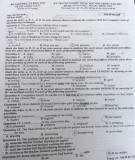
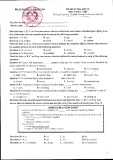
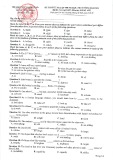
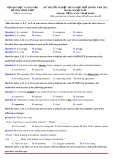
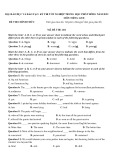
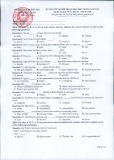
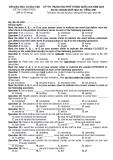
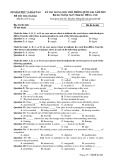




![Đề thi tiếng Anh tốt nghiệp THPT 2025 (Chính thức) kèm đáp án [mới nhất]](https://cdn.tailieu.vn/images/document/thumbnail/2025/20250627/laphong0906/135x160/9121751018473.jpg)








![11 chủ đề ôn tập môn Toán lớp 2 [chuẩn nhất]](https://cdn.tailieu.vn/images/document/thumbnail/2025/20250613/phuongnguyen2005/135x160/74791749803387.jpg)



